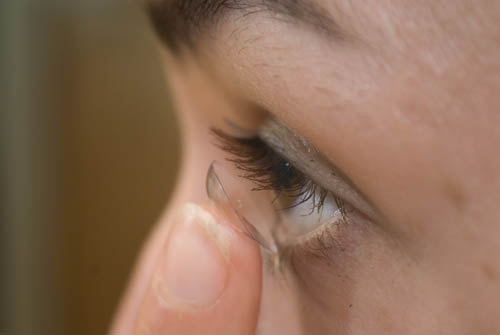Do You Suffer From Allergies or Dry Eyes?
What about contact lenses?
 Everyone looks great in contact lenses because you show your real face to the world, but some people find them too uncomfortable to wear. Contact lenses float over the cornea, right on the eye surface. Most people who wear contact lenses and have prescriptions like farsightedness, nearsightedness, astigmatism, and presbyopia buy corrective lenses. The right contact lens prescription can provide 20/20 vision without the annoyance of eyeglasses frames on your face. Unfortunately, a large proportion of people find contact lenses uncomfortable. Eye irritation is the #1 reason for the discontinued use of contact lenses.
Everyone looks great in contact lenses because you show your real face to the world, but some people find them too uncomfortable to wear. Contact lenses float over the cornea, right on the eye surface. Most people who wear contact lenses and have prescriptions like farsightedness, nearsightedness, astigmatism, and presbyopia buy corrective lenses. The right contact lens prescription can provide 20/20 vision without the annoyance of eyeglasses frames on your face. Unfortunately, a large proportion of people find contact lenses uncomfortable. Eye irritation is the #1 reason for the discontinued use of contact lenses.
Dry eyes are associated with eye irritation, even without contact lenses, but the condition is exacerbated when a piece of plastic prevents the eye from breathing and interferes with the natural lubrication that tears offer. To avoid having to treat this chronic eye condition, many people simply stop wearing their contacts.
Ocular allergies, which is the eye’s way of reacting to an allergen you have been exposed to, can lead to watery eyes, itchiness, redness, and dry eye. Ironically, while antihistamines – the treatment of choice for eye allergies – can provide excellent relief for most allergy symptoms, it tends to make dry eyes even worse. Does that mean that people with eye allergies and dry eyes can’t wear contacts?
Can you wear contact lenses even with dry eyes and allergies?
Daily contact lenses, when worn appropriately are the cleanest, healthiest way to wear a contact lens. Daily disposable lenses are convenient to use because you don’t have to worry about cleaning and storing the lenses at night. This makes them especially great for travelers and teens.
Allergy sufferers may notice their eyes feel worse after a few days of wearing the same lenses. The allergen can build up under the lens, re-exposing the eye to the offending substance. Single-use contacts provide an opportunity for a fresh, clean lens every day, reducing the amount of allergens that can build up on a contact lens. If your eyes are sensitive, you should definitely consider daily disposable contacts.
While some eye drops cannot be used with contact lenses at all, 1-day contacts usually work well with daily allergy eye drops. Often patients can put their allergy drops in prior to lens insertion or right after removal. It is always best to read the label and speak with your eye doctor for instructions on appropriate use.
Single-use contact lenses reduce the frequency and onset of Giant Papillary Conjunctivitis (GPC) that causes itching and inflammation under the upper eyelids. This is not a seasonal allergy but a contact lens-related allergy.
Compared to monthlies or extended wear lenses, 1-day contact lenses also reduce the risk of conjunctivitis and corneal ulcers. There is less potential for an eye infection to develop on a lens that is only used once. Furthermore, contact lens wearers who do develop an infection do not have to worry about contaminating the pair they always wear, because a brand new pair of contact lenses is waiting to be opened the next morning.
Daily contacts, especially those that are made from a material that allows more airflow and exchange of moisture, can be more comfortable for patients with dry eye syndrome.
Dailies may seem more expensive initially, but the cost is offset by avoiding the need to buy contact lens solutions on a monthly basis. Plus, when a lens is torn or lost, the financial loss is negligible if you’re talking about a daily disposable lens. In the end, you may save money using daily contacts.
At Wesson and Mothershed Eye Center, the ophthalmologists and optometrists offer eye exams as well as contact lens fitting, and recommend daily disposable contact lenses for those with sensitive eyes or dry eyes and eye allergies. If you have dry eyes or allergies, consult with our practice in Tupelo, the contact lens experts.
